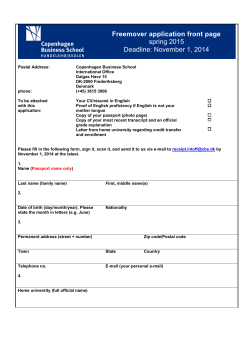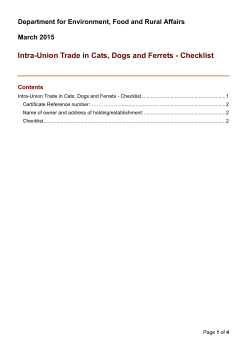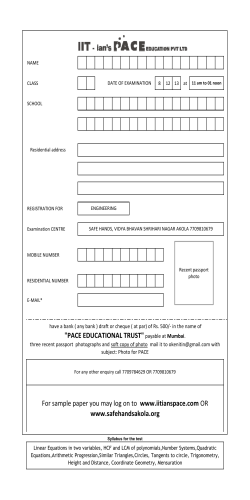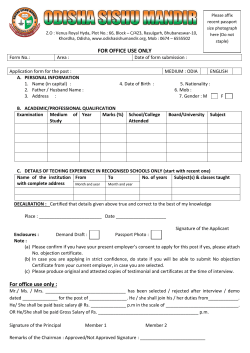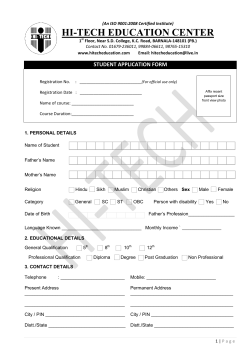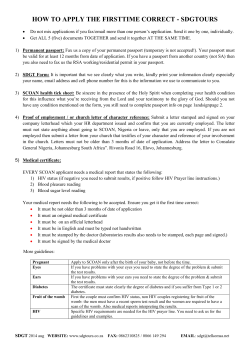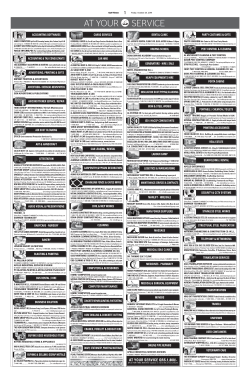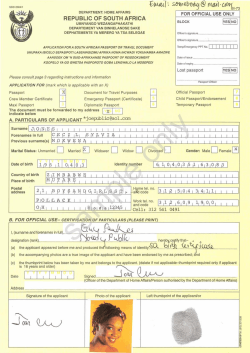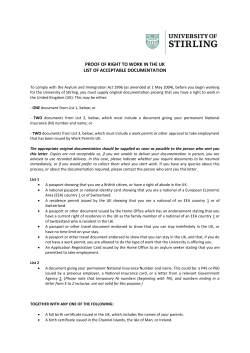
INFORMATION - Ministère de l'Agriculture
FRENCH MINISTRY FOR AGRICULTURE, FOOD AND FORESTRY INFORMATION From 29 December 2014 HEALTH REQUIREMENTS FOR TRAVELLING WITH PETS TO COUNTRIES IN THE EUROPEAN UNION FROM 29 December 2014 (non-commercial movement) pets: animals such as dogs, cats, ferrets, rodents and domestic rabbits and birds (all species except poultry*), reptiles, amphibians, ornamental tropical fish, invertebrates –except bees and crustaceans-, accompanying their owner or a natural person who has taken responsibility on the owner's behalf during their movement and which are not to be sold or subject to a transfer of ownership *Poultry = as per the definition provided in regulation 2009/158 EC: fowl, turkeys, guinea fowl, ducks, geese, quails, pigeons, pheasants, partridges and ratites (Ratitae). A - Travelling with Cats / Dogs / Ferrets within the European Union Animals must have, in the order indicated below: 1 - identification: animals must be identified by a microchip (electronic identification system) or by a clearly readable tattoo (applied before 3 July 2011) to travel within the EU. 2 - a valid vaccination against rabies given at a minimum age of 12 weeks (first vaccination and boosters); 3 - a passport attesting the animal’s identification and valid vaccination against rabies delivered by a veterinary surgeon accredited by the competent authority (in France, a veterinary surgeon with a health accreditation); Passports issued from 29/12/2014 must comply with the new passport (improved security for the animal identification page, which is now covered with a transparent film, and indication of start and end of validity dates for rabies vaccinations). If you already have a passport issued prior to this date, there is no need to change it. B – Travelling to Ireland, Malta, the United Kingdom and Finland In addition to the requirements in section A, dogs must also: − have been administered treatment for tapeworm not less than 24 hours and not more than 120 hours before its scheduled arrival time, − the treatment must be recorded (date and time) by the veterinary surgeon who administered it, in section VII of the European passport for the animal in question. − Travel by a means of transport authorised for Malta and the United Kingdom (you cannot use a private boat or plane). C - Travelling with more than 5 dogs, cats, ferrets From 6 dogs, cats, ferrets, in addition to the requirements indicated in A (and B where appropriate) above, trade requirements apply. It is necessary to: − − − have a veterinary surgeon with a health accreditation perform a physical examination of the animal within 48 hours prior to the departure time recorded in section X of the European pet passport for each animal, obtain a certificate (TRACES) attesting compliance with the health requirements indicated above by contacting, in France, the Direction Départementale (de la Cohésion Sociale et) de la Protection des Populations (Departmental directorate for social cohesion and the protection of citizens) in your département, travel by an authorised means of transport. Exemption from these requirements if the animals are taking part in a show, a competition or a sporting event, and only in this context if: the animals are aged over 6 months AND the owner has a registration document for the event (dates / place of participation / identification of animals entered). This registration document may be supplemented by certification by the owner. 1/2 Important information Health requirements: The health requirements must be fulfilled in the order previously given (identification / vaccination / treatment against parasites), and recorded in the passport. Treatment against tapeworm must be administered within 120 to 24 hours before arrival. First vaccinations are deemed to be valid after at least 21 days. Some Member States may, under certain conditions, allow animals under the age of 12 weeks and not vaccinated against rabies or vaccinated but for which the legally stipulated period for development of antibodies has not yet elapsed, into their country. It is the owner's responsibility to check these requirements specific to each Member State. France has not chosen this option. Identification: If domestic carnivores are microchipped, the owner or natural person in charge of the animal must ensure that the electronic identification system (microchip) is readable. IMPORTANT: since 3 July 2011, all animals are required to be identified by a microchip or by a clearly readable tattoo (applied before 3 July 2011) to travel within the European Union. Penalties which may be applied if regulatory obligations are not fulfilled If the above-mentioned health requirements are not complied with, the officials in charge of checks can have the animal sent back to the country of origin at the owner's expense, have it put into quarantine or have it put down. For more detailed information, owners of domestic carnivores can browse the websites in the following countries: • Ireland: http://www.agriculture.gov.ie • Finland: http://www.evira.fi/portal/en/about+evira/publications/? a=category&cid=32 • United Kingdom: http://www.defra.gov.uk • Malta: http://www.mfa.gov.mt/ They can also browse the website of the French Ministry for Agriculture, Food and Forestry: • • http://ec.europa.eu/food/animal/liveanimals/pets/nocomm_intra_fr.htm http://www.agriculture.gouv.fr/animaux-de-compagnie D - Other pets: • • • • Rodents and domestic rabbits Cage birds Reptiles Amphibians When travelling to another Member State, you should find out the country-specific requirements by contacting the country’s Embassy. Furthermore, these animals must not be intended for sale. 2/2
© Copyright 2026
